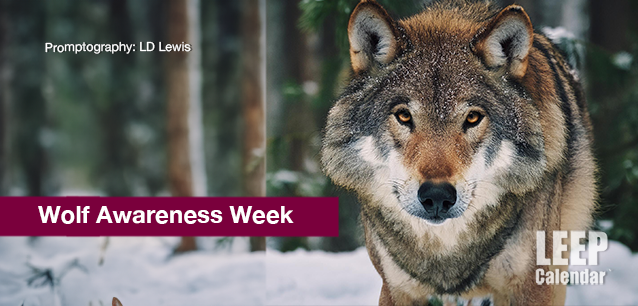 AD
AD
Today is: December 07
Scroll to explore events active on this date.
Additional Events on LEEP
LEEP INK FEATURES

August? Absolutely!
In August, we live through the Dog Days of Summer. It's hot and often humid, and those who can leave for better climates do. Down south, winter is in full force. August is also known as "the ...

In The Heat of July: July 2025 Events
Is it hot enough (or cold enough if you're below the equator) for you yet? There is actually a day for that! Like every month, I pick a diverse collection of events you may or may not know about. This ...

May Blooms: Events in May 2025
Along with October, May is one of the most densely packed months of the year. It's before the summer humidity and the last whole month of the school year. The weather is warming in t...
About Wolf Awareness Week
Ends: Oct 25, 2025
DESCRIPTION:
WOLF AWARENESS WEEK:
ADVOCATING FOR NATURE'S MOST INTERESTING CANINE
Wolf Awareness Week is an annual event dedicated to celebrating and promoting the conservation of wolves. Held in October, this week aims to educate the public about the role of wolves in the ecosystem and the challenges they face for survival.
Initiated by wolf advocates and conservation organizations in the United States, Wolf Awareness Week seeks to dispel myths about wolves and highlight the scientific efforts to help their populations thrive. Various wildlife organizations, zoos, and educational institutions come together during this week to hold informational sessions, workshops, and wildlife tours.
DIVERSITY OF WOLF SPECIES
Globally, there are two main species of wolves: the gray wolf (Canis lupus) and the red wolf (Canis rufus), each with several subspecies. The gray wolf subspecies are spread across North America, Eurasia, and parts of Africa, while the red wolf is primarily located in the southeastern United States. Each subspecies adapts to its specific habitat, showcasing variations in size, behavior, and diet.
Wolves are found in a variety of habitats, including tundras, woodlands, forests, grasslands, and deserts. They play a crucial role in maintaining the health of these ecosystems by managing the populations of other species and thus helping to keep a balanced food chain. As apex predators, wolves help control the numbers of smaller predators and herbivores, which in turn influences vegetation patterns and biodiversity.
During Wolf Awareness Week, participants engage in activities such as guided wildlife tours to observe wolves in their natural habitats, educational programs that discuss wolf behavior and conservation strategies, and advocacy efforts to promote policies that protect wolf populations. Social media campaigns also play a significant role in spreading awareness and rallying support for wolf conservation.
PARTICIPATION
The main objectives of Wolf Awareness Week are to foster a greater understanding of wolves and their ecological benefits, correct misconceptions that lead to their persecution, and encourage support for conservation measures that protect their natural habitats. The event underscores the importance of preserving these magnificent creatures to ensure the stability and diversity of ecosystems where they play a pivotal role.
By participating in Wolf Awareness Week, individuals can contribute to a broader conservation effort that recognizes the intrinsic value of all wildlife, including predators like wolves, in maintaining the health of our planet.
VIDEOS
SUPPORTING DOCUMENTS
Currently, this event does not have supporting documents.
ADDITIONAL IMAGES
Currently, this event does not have supporting images.
Where would you like to go now?
 AD
AD


/footer-logo.svg)
